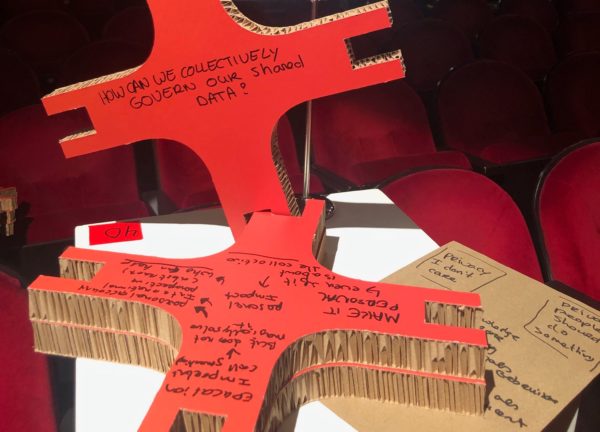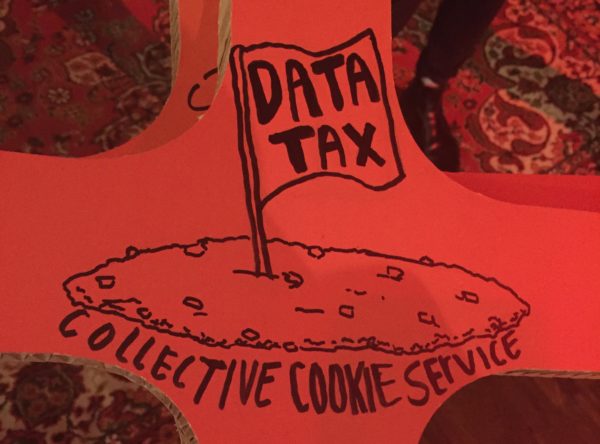
Privacy concerns (us all): food for thought after participating in BigxBrainstorm
Judith Blijden Adviseur auteursrecht en digitale cultuurLast week my colleague Lisette and I participated in the biggest brainstorm that took place during TEDxAmsterdam. As one of the hundred Trigger speakers, I was asked to give an inciting 2,5 minute pitch to groups of TEDx attendees. I chose to discuss an issue within the theme Technology that directly affects us both individually and collectively – privacy. More specifically I wanted to discuss privacy as not an issue of the individual, but as something that should be seen as a public good.
Privacy as public good
In the multiple brainstorm sessions++Brainstorm sessionsMy colleague Lisette and I held 4 brainstorms each. Each brainstorm started out by a 2,5 minute pitch that was followed by 12 minutes of discussion. Finally, the participants had 3 minutes to write down their most important ideas. we conducted, inciting ideas surfaced. Most participants were familiar with the General Data Protection Regulation (GDPR), since it has just been implemented across Europe. The GDPR enforces rules to protect your personal data. It does not cover, however, that to regard privacy as an issue of the individual is to undermine a solidarity in which we understand that the misuse of data is detrimental to our shared public values, like democracy and equality. We wanted to include the societal impact of privacy in the discussion about privacy and not just focus on individual rights. The consequences of the misuse of data++Consequences of the misuse of dataIn the article ‘Alleen als we privacy zien als iets dat ons allen aangaat, kunnen we de techbedrijven temmen (Only if we see privacy as something that concerns us all, we can tame the technology companies)’, Dimitri Tokmezis and Maurits Martijn warn us for the societal effects the results from the abuse of privacy. Only in Dutch. that excludes your data, can still affect you.
Take Amazon’s recruitment algorithm, that was scrapped last month. The most pre-eminent programmers in the world could not fix the algorithm from consistently favouring men over women, as the tool was trained on data submitted by mostly male applicants over a 10-year period. The fact these men agreed to their data being used for this purpose resulted in women having less chance to land a job at Amazon. The most pre-eminent programmers in the world could not fix the algorithm from consistently favouring men over women, as the tool was trained on data submitted by mostly male applicants over a 10-year period. The fact these men agreed to their data being used for this purpose resulted in women having less chance to land a job at Amazon.
The Question
We need a frame change in discussions about privacy, in which we understand privacy as a public good. We need collective self-determination in the digital environment. That means that you not only have control over your own data, but also over the use of data that impacts society as a whole. During Tedx I wanted to experiment with what this frame means to people and was curious to see how we can collectively set privacy standards for the benefit of our society. At Kennisland we are working on finding new narratives to discuss digital policy across the European Union++Reframe Digital EuropeOur project ‘Reframe Digital Europe’ we work together with our partners Centrum Cyfrowe and the Commons Network on creating new narratives that allow for digital policies that enforce European public values.. Our ambition is to create a European vision of the digital society in which privacy as a public good takes a central position. Getting a better understanding what privacy as a public good entails is essential to us. Therefore the question during the brainstorm was: how could we collectively govern our shared data?
The outcomes of the brainstorm were impressive – especially since the brainstorms were only 12 minutes long. The initial ideas should naturally be further developed and examined. Most outcomes focused on three elements: awareness, power and governance. I will outline the most important ideas that surfaced throughout the brainstorm.

People could write their ideas on puzzle pieces.
Awareness increases control
The most important aspect all groups brought up, was the need for creating awareness on what privacy is, what data is and how it impacts us individually and as a collective. Self-evidently, the need for education on data and the internet in general is very necessary, yet lacking in our education system. It is important that we create awareness, not just by explaining risks, but empower children and adults so that we increase their understanding and control.It is important that we create awareness, not just by explaining risks, but empower children and adults so that we increase their understanding and control. Technology can be empowering, depending on how its used.
In the end creating awareness is about creating well-informed groups of people who can then consciously decide what choices they want to make and what standards they want to set. In order to do so we need transparency, not only on how data is used but on how data travels. Multiple participants suggested technological inventions that could support a better understanding on data. Some called their idea a ‘digital passport’, others the ‘snapchat of data’ and another the ‘digital vault’.
The idea is as follows: a digital identification system that allows you to log in to all websites. Once logged in, you can see an overview of all your subscriptions and how your data is being used at these different websites. You can also control you data from your digital passport, which will have immediate effect to all platforms where your data is used. It should even be able, when creating data, to inform the system when this data should be deleted, hence the ‘snapchat++SnapchatSnapchat is a multimedia messaging app that removes the messages send by a user in a designated amount of time from the device it has been send to. of data’. We can only evoke changes if we know how the systems work. While a digital passport would initially only focus on the data of the individual, it would enable the individual to understand how their data travels and how they can work with other. Once data flows become visible of larger groups, we can see how we can influence them, for instance by collectively retracting our data++Collectively retracting dataThe Dutch Data Labour Union organised a strike where a collective of people withdrew their location data from Facebook. Read more here. from a particular service as the Dutch Data Labour Union did. Or, by collectively giving data to the benefit of scientific research or technological innovation.
A better power balance is necessary
TWe can only evoke changes if we know how the systems work.he power disbalance that exists between individuals and companies that use their data, is one of the bottlenecks in getting more transparency. Participants noted that as a user of services you do not have the position to take a stance towards a provider or set any terms or conditions. It’s an ‘all in or out’-deal. If you don’t agree with their privacy policy, you will need to look for another service. The GDPR did gave users rights, such as the right to request erasure for your personal data. These improve the positions a users a bit. It also enforces the idea that it is the responsibility of individuals.
Some participants noted that a power disbalance could be more easily changed if individuals work together and if governments set higher standards to large tech companies. Users can only require better terms by grouping together. Participants hoped that more awareness would lead to larger social movements that would improve their position in relation to the big tech companies. Once such a movement would exist, a number of measures should be required:
- Companies install a ‘reverse newsletter’ that informs you on how they use their data. Companies that you are subscribed to should send users an overview that tells the user what personal data the company has, how this is used and how their data relates to services they provide in an understandable way. This discharges the individual of going after his own data and gives that responsibility to the company.
- Users should have a choice not only if their data is used, but should be able to set terms and conditions that do not follow an ‘all in or out’-principle. Social movements should negotiate with tech companies on better terms and conditions.
- Governments should also recognize that data is a form of currency and create policies that deal with this, such as installing a tax on making profit out of data, the ‘data-tax’. Free services aren’t really free++If the service is free, you are the productJohn Lanchester argues in his essay ‘You are the product‘ on Facebook for the London Review of Books that people should become aware that if the services is free, you and your data are the product. . Often, when you do not have to pay with money, you pay by providing your personal data often unknowingly.Free services aren’t really free. Often, when you do not have to pay with money, you pay by providing your personal data often unknowingly. Data tax would make the online playing field fairer so that subscription-based platforms can better compete with data-based platforms.

During one of the brainstorm an artist made this drawing out of the ideas mentioned by the participants.
Who governs the internet?
Attendees were split on who would need to oversee the standards we want to set on the use of data. Who would need to create educational programs? Who would need to develop the digital vault? Who would need to create new policies? Who would need to enforce regulation?
Some were in favor of better enforcement by the state and the European Union (or even the United Nations). They believed international organisations would be the only ones who could actually influence big players like Facebook or Youtube. Others did not like this at all, and weren’t a fan of the government policy companies on dThe focus of the brainstorms on the elements of awareness, power and governance, was right on. In order to ensure a (digital) society in which we can impact and use data in order to improve values we find important, these are exactly the elements we need to be keep thinking about.ata. They immediately thought about a scary Black Mirror-episode++Black MirrorBlack Mirror is a sci-fi anthology series that explores a twisted, high-tech near-future where humanity’s greatest innovations are often portrayed as detrimental to our well being and public values.
or the China’s social behavior policy++China’s social behavior policyChina has set up a ranking system system that will monitor the behavior of its population, and rank them all based on their social credit. A bad score can severely impact your life, for instance what school you can get admitted to or whether you can receive a loan. Read more here.. They favored decentralized technological options such as the blockchain, or were in favor of collective citizens movements who would take this upon themselves.
Developing a European vision of the digital society
The amount of ideas that came out of 4 times 12 minutes of brainstorm is impressive and inspiring. It was clear that this topic was important to a wide range of people – from engineers to psychologists to an employee of Jimmy Nelson! The focus of the brainstorms on the elements of awareness, power and governance, was right on. In order to ensure a (digital) society in which we can impact and use data in order to improve values we find important, these are exactly the elements we need to be keep thinking about. TEDx visualized all ideas in the form of puzzle pieces which is exactly what they are.
We need to keep on puzzling until we get a better understanding of the challenge at hand and how we solve it. Are you inspired by the suggestions by the TEDx participants or do you think something is missing? We are looking for people who would like to further develop these ideas together with us. If you want to get in touch with us, send an email to Judith and/or Paul via info@kl.nl.

